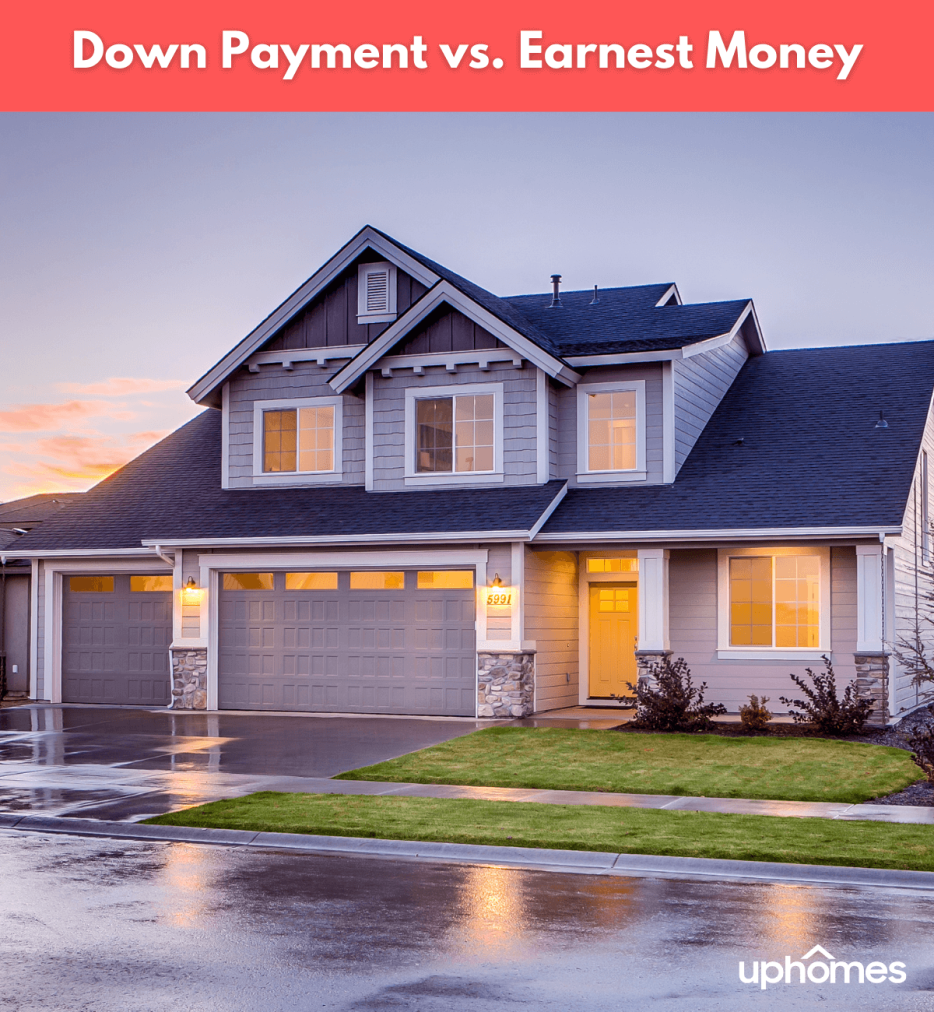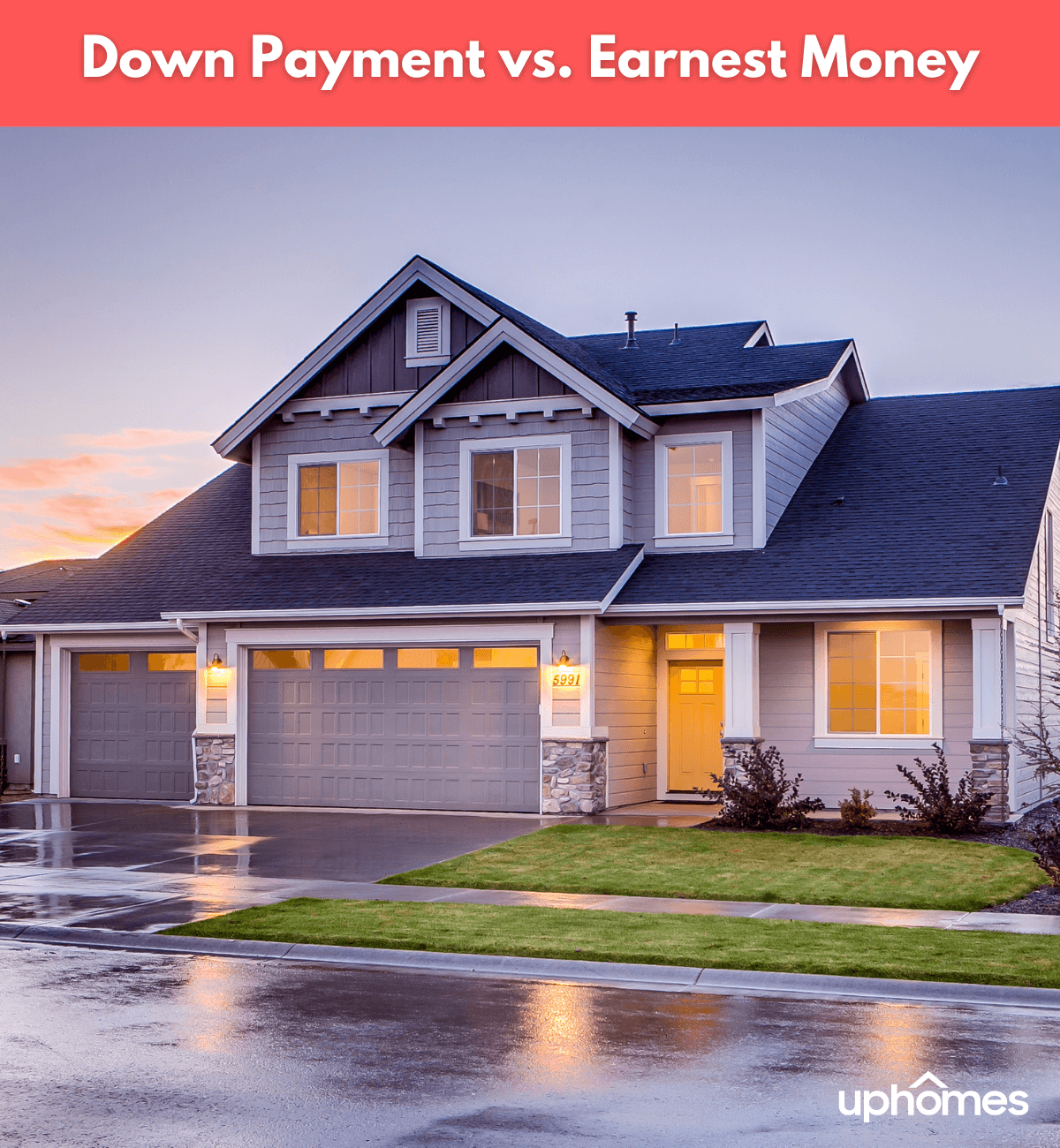February 14th, 2021

Down Payment vs. Earnest Money: How Do They Differ?
Are you trying to understand what makes a down payment different from earnest money? If you're struggling to figure out these real estate terms, you've come to the right place.
Read on to learn about the differences between these terms!

When it comes to a down payment vs. earnest money, you want to be a prepared buyer and you want to know this information before you go under contract.
Understanding Down Payments
Down payments refer to the initial payment you make to secure a home. But how much you put down can vary and impact how much you pay over time.
Purpose of the Down Payment
With the down payment, you pay a percentage of the home's total price upfront. As the buyer, you're responsible for determining how you'll cover the remaining costs of the house. Generally, this will happen in the form of a mortgage loan that you secure through a lender.
Is a down payment refundable if you change your mind about the house? It depends. You'll want to check the written contract to confirm whether you can get your money back if you walk away from an agreement. Oftentimes, this is one of the cons of buying new construction - they will require some of your down payment money upfront in the form of a deposit.
Working with a Lender
Your mortgage lender will look at your debt-to-income ratio and credit score. By doing this, they can determine what type of monthly payment is realistic — and how much to loan you. They'll also help you determine the down payment amount.
If you're early in the process of shopping for homes, consider getting preapproved. This step requires that you show a lender a source of income and credit history. You'll also need to show your social security number.
A preapproval may last for around three months, but it depends on the lender. Be aware that getting preapproved doesn't always mean you'll get approved. To get your preapproval renewed, the lender may need to check your credit again.
A preapproval helps you see how much house you can afford. And it lets sellers know that you have the means to pay for the house.
Determining a Down Payment Amount
When it's time to make a down payment, you may be wondering how much money you need to hand over. The answer to this question can vary, but you're better paying as much as you can in the down payment.
How Much You Should Put Down?
The common amount to put down is 20% of the total cost of the home. You would do this through a conventional loan. And this amount should come from your savings — not from a lender. There will be different programs available to different buyers including first-time homebuyer programs.
Your lender might have some suggestions if 20% is too steep. A Federal Housing Administration (FHA) loan, for instance, allows you to put down a much smaller amount, such as 3.5%. But you'll need to pay insurance on your loan, too.
With a Veterans Affairs loan (VA), you may not even need to make a down payment. If you're a veteran or active in the military, this might be a cost-effective loan to pursue. There are some location-based offers as well depending on the area you live. This is part of what makes the location so important.
Paying More Now Means Paying Less Later
Know that the amount you put down on a new home can impact your loan's interest rates. Your interest rate on the remaining amount of the home will be lower if you make a bigger down payment.
The downside to an FHA loan or other option with a lower down payment is that you'll have to pay more later. With the addition of a higher interest rate and insurance, you could pay a lot more than your home is worth.
Understanding Earnest Money
Earnest money is money that you put down as a sign of your intention to buy a home. It's different from a down payment — but connected to it.
The Purpose of Earnest Money
Think of earnest money as a sign that you are serious about purchasing a house. It communicates to the seller that you want to move forward with the next steps — and have your finances in order. Usually, the home will also be listed under a pending status at this point.
The seller will take the house off the market once the earnest money is in escrow. The seller is taking a risk doing this under the assumption that you're committed to buying the home.
If something falls through during the next steps, you may be able to get the earnest money back. But if you walk away from the home for reasons not allowed in your written agreement, the seller keeps the money.
How Much to Put Down in Earnest Money
The answer to this question varies depending on where you live. In some places, you'll put down a small percentage of the home's value. This percentage may be around 3% or less.
If you're buying a home that costs $300,000, that means you'll need to pay around $9,000 in earnest money. The higher the price of the house, the more earnest money you'll need to pay. Make sure to account for this money in the home-buying process.
In other places, the earnest money amount may be fixed. You'll want to check your state's regulations and work with your agent to know what to expect.
Know Where Earnest Money Fits In the Process
What happens to the earnest money? And can you put down more? It's good to know the answer to these questions so you can win over the seller in a bidding war.
Where the Money Goes
Your earnest needs to go into an escrow account. Think of an escrow account as a place where your money is protected.
It's important to use a third party, like a bank, to ensure the money is safe. Do not hand over money to a seller with the assumption that you'll get it back. You want to keep the money protected and documented.
What to Do In a Competitive Housing Market
What if you're trying to buy a home in a seller's market? When there's a lot of competition for a home, you could put down more in earnest money. This is a strategy that can work in your favor.
Putting down a higher amount shows that you have the means to pay for the house. It also shows that you're a motivated buyer. The seller might be more interested in choosing your offer if they feel confident about you.
Down Payment vs. Earnest Money Comparison
Are you wondering if the earnest money you put down is different than a down payment? It is and it isn't. Here's what that means for you during the home-buying process.
One Payment Impacts the Other
The earnest money and down payment both are payments made on the front end of the home-buying process. But you may not need to think of them as two separate payments. In fact, one can become part of the other if the deal moves forward.
The down payment will be the larger of the two payments. Eventually, your earnest money payment may become part of the down payment. When you close the deal with the seller, the earnest money can go toward either the down payment or closing costs.
Map Out Your Budget for Each Payment
When you're approaching a big financial decision like buying a house, do the math first. Do you have enough money stashed away to pay 20% of a $200,000 house as a down payment? And do you have enough to cover earnest money and closing costs?
While the earnest money amount will be smaller than the down payment, the process could speed up. And you'll need money right away to complete the down payment. A motivated seller might be eager to move forward, so be ready.
What Is Due Diligence?
Earnest money and down payments come into play during the period called due diligence. On the front end of the home-buying experience, you'll need to commit some money to fees and evaluations.
Defining Due Diligence
Think of due diligence as a time frame where you'll need to gather important information about the property. The due diligence time period stretches from after an offer you make is accepted — and before closing on the home.
The time frame could be around two weeks, but it could be longer. In some instances, however, you'll have a smaller due diligence time frame.
Check the writing in the agreement with the seller so you know how much time you're working with. This is especially true if you're relocating to a new area where you're unfamiliar with the neighborhood.
The Due Diligence Fee
The due diligence fee is a different fee than earnest money. You pay this fee to the seller when you make an offer that the seller approves.
With the due diligence fee, you make a deposit that won't be refunded. Think of it as the fee that permits you to move forward with appraisals and inspections.
How Due Diligence Fits in the Home-buying Process
Due diligence gives you a valuable stretch of time to know what you're getting into with a property. But because you may only have a few weeks, you need to enter due diligence as a prepared buyer.
What Happens During Due Diligence Early in the Process
You'll sign a contract once the seller accepts your offer. This is referred to as being under contract. Make sure to read the contract so you know exactly how much time you have.
During the early part of due diligence — even before you make an offer — you'll need to figure out your financing for the home. This includes getting approved for a loan and knowing what kind of down payment you can make. Your lender will want to see evidence that you have the savings and cash flow to make recurring mortgage payments.
What Happens During Due Diligence Later in the Process
During due diligence, you'll want to get the home inspected and check out the neighborhood. A home inspector will look at your HVAC system, foundation, roof, and electrical systems. You'll need to get the home appraised, too, and complete a property survey.
It's also wise to check for radon and lead paint. Any red flags could be grounds for renegotiating your contract with the seller.
How Due Diligence Impacts Earnest Money and Down Payments
You should approach due diligence with a budgeting strategy. This begins with understanding when you'll be responsible for making payments, such as down payments and earnest money.
Due Diligence and Earnest Money
You'll put earnest money in escrow once the ink dries on a purchase agreement. In other words, you need to come up with cash right away during due diligence. Remember that this money isn't always refundable if you back out of the deal.
Before you make an offer, make sure you have the money ready — and maybe a little extra if there's competition for the home. Know your state's rules on earnest money. In some cases, you may need as little as $500 to make this deposit.
Due Diligence and Down Payments
With a down payment, you offer money from your savings as opposed to a lender. Like the earnest money, the down payment money will sit in escrow.
While it may sound better to make a lower down payment to save money upfront, reconsider this plan. With a lower down payment, your lender may want you to pay insurance on top of the interest. This could be anywhere from a fraction of a percent of the loan amount up to 5%.
If you're able to put more money down upfront during due diligence, do it. You could save thousands of dollars in interest per year!
Down Payment and Earnest Money
When it comes to a down payment vs. earnest money, knowing the difference is key. You want to feel comfortable that you're paying a fair amount. And you want to know when you'll need to make these payments during due diligence. The questions about how down payment money, earnest money and due diligence money fit in the process are some of the most common questions asked in the real estate world. When buying homes there is a lot that goes into the process!

Ryan Fitzgerald
Hi there! My name is Ryan Fitzgerald, and I am a REALTOR®. My goal is to help you learn more about real estate through our Real Estate Blog! Hopefully, you enjoyed the above blog post and it found a way to provide help or value to you. When you're ready to buy or sell a home of your own let us know here. Please feel free to join the conversation by dropping us a comment below.

